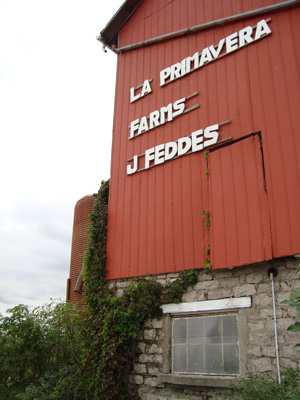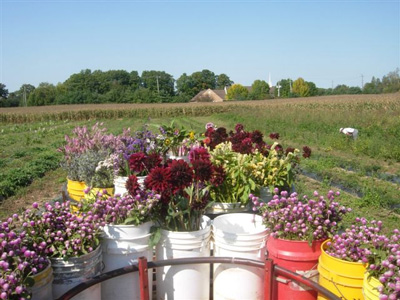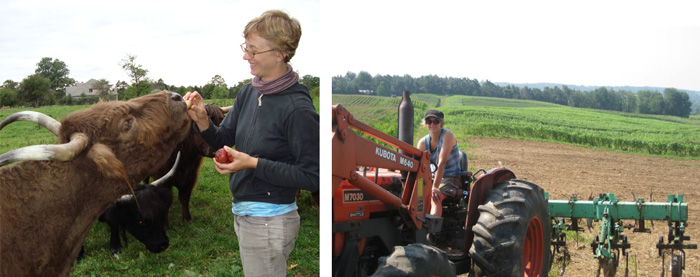Posies and Diversity at La Primavera Farms
When Joanne Feddes talks about farming, her eyes light up: “Some people like to tinker on their cars and in their garages. I like to run around my farm and start new projects, build chicken coops or make hay for the cattle.â€
Her passion for the profession originated in a childhood spent milking cows and cleaning barns, “We came home, did chores, and hung out with the animals. Those were our extracurricular activities. I loved it.â€
Two decades later, Joanne farms in partnership with her father, Juan, on their 300 acre property just outside of Dundas, Ontario. The farm’s name, La Primavera, means ‘springtime’ in Spanish; Juan’s parents penned the name in 1954, in honour of the land they left behind in Argentina. The farm maintains that sense of high hopes and fresh beginnings. It is also strikingly beautiful, situated in Ontario’s Greenbelt, with a view of the escarpment hills and city lights in the distance.

Beyond such grand vistas, small touches are what make the farm memorable: the trellis surrounded by bright marigolds, hydrangea bushes bordering the farm sign, the big red barn accented by green vines. The pond in the front yard, replete with diving board and green canoe suggests a peaceful haven amidst the busyness. Juan Feddes proudly introduces his home as ‘our little piece of paradise.’
Such attention to detail mirrors the family’s careful business planning. In 1996, Juan sold his herd of cows, bought chickens, and began to grow cash crops and cut flowers. When making this transition, he kept his daughters in mind.
“Dad had four girls running around, needing work, and he knew if the farm was more diversified, there’d be something that each of us would enjoy doing and be able to make a living on. Plus, he’d always loved growing flowers.†Joanne explains.
The Feddes’ cut flower business started small, but has grown over the years, and is now producing more then 40 acres of flowers each season. Their specialization is sunflowers, but they grow to fit the season: with peonies in the spring, and ornamental cabbages and kale in the fall. Hand-picked, cut, and carefully prepared, the flowers are a sight to behold.
The farm is also part of the Ontario Flower Growers (OFG), a large grower cooperative that promotes and markets locally-grown flowers. The organization has helped the Feddes access lucrative new markets, including grocery stores across the province. This is an invaluable service, as the majority of flowers in Ontario are imported, even during the summer months.
The OFG’s main headquarters are in a warehouse in Mississauga. In this industrial setting, bouquets are auctioned off in vast quantities, and growers learn about new and unique varieties. The auction is a little-known and fascinating world at the intersection of technology, business, and beauty—with the end product being the bouquets that grace Ontario kitchen tables.

Alongside these larger markets, Joanne finds great enjoyment in selling her posies at the Dundas and Ancaster farmer’s markets*. She likes interacting with customers and creating the bouquets: arranging delphinium, lavender, statice, and lemon geranium with accents of fresh basil and dill.
"If there are any herbs left over, we make pesto and pickles to sell!†Joanne says with a smile. “People love our flowers. They are never on the list of the first thing to buy at market, because vegetables always come first. But the bouquets are so pretty you just can’t help yourself.â€
Besides the flower business, Joanne has a soft spot for cows, well-rooted in her childhood: “Feeding calves in the barn when I was a kid was really great. I’d get to hang out in our big barn with straw bales and warm cows and cuddly calves that would nuzzle into you.â€
During high school, her tastes shifted, but the chores didn’t. At high production time, Joanne and her sister would get up at midnight and milk the cows while listening to Michael Jackson tapes. They’d go back to bed and then have to get right back up again for school. The sisters also raised cows for 4-H — the club of choice for country kids — and showcased them at regional fairs.
Upon hearing these childhood stories, one understands how Joanne could consider raising 20 head of Highland cattle as a 'side' project. "They don't make me a lot of money, but I love the beef cows. And they provide my family and friends with hi-quality meat," Joanne explains.
The Highland herd grazes on thirty acres of pasture that Joanne rents from a neighbour and family friend, for “wine, steak, or a bottle of scotch." She has names for all her cows, and honours the matriarchs of the herd, feeding them the choicest apples when stopping by for a visit.
Besides the beef, the farm also has two large chicken barns housing nearly 30,000 meat birds each year. The poultry are supply-managed, providing the one consistent source of family income, something that Joanne values highly. She prides herself on excellent animal husbandry.
When talking with Joanne, you can tell that countless hours on the tractor have fine-tuned her ideas. She recognizes that mixed farming is good for the land; while different income streams pay the bills. She understands how supply management creates a stable income; but can be a barrier to new farmers. She practices crop rotation with an eye to the finances. “I’ve learned that if I grow rye to plough it down for the soil, then I’m also saving fertilizer in the long run.â€
 Much of this thinking coalesced when Joanne’s daughter Margot was born. “I’ve learned a lot about the business aspects of farming over the last couple years. Originally, I just wanted to grow food, raise cows, and didn’t realize where all the money had to come in. I now have my own bills and my own family.â€
Much of this thinking coalesced when Joanne’s daughter Margot was born. “I’ve learned a lot about the business aspects of farming over the last couple years. Originally, I just wanted to grow food, raise cows, and didn’t realize where all the money had to come in. I now have my own bills and my own family.â€
Joanne hopes that hard work and careful planning will continue to support the three generations of Feddes who call the farm their home. It’s a big commitment, but one that comes naturally, from growing up on the farm and with a deep enjoyment of the day-to-day work. She easily rhymes off the benefits of being a farmer: from keeping your own schedule, to being creative, a Jill of all trades and the caretaker of a beautiful piece of land. It’s not a nine to five profession, but is well worth the effort. As Joanne says, “Ask any farmer, and they’ll tell you it’s a lifestyle.â€
www.laprimaverafarms.com
La Primavera Farms is a proud member of the Ecological Farmers Association of Ontario. For more information, please visit www.efao.ca.
Photo credits: Melissa Benner
(* Both of these markets were started recently, and Joanne was integral to their formation. She was part of a group of farmers and citizens who organized the Dundas market in 2008/2009, and she continues to sit on the 2010 Ancaster market advisory board.)

